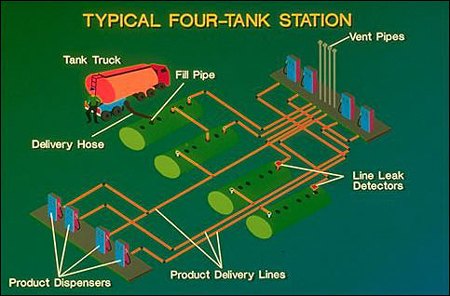Hot Fuel a Hot Button for Big Oil Watchdog, LA Times
When the temperature of the gasoline crests 100 degrees, the fuel loses roughly one percent efficiency. That may not sound like much, but OilWatchdog.org says its a freakin' scam. "At the higher end of fuel temperatures, 105 degrees, the energy loss is nearly a dime a gallon. Drivers' losses boost the bottom line of oil companies." Needless to say, the group supports the "hot fuel" class action lawsuit against ExxonMobil. They're also offering a free, official-looking "motor fuel ripoff notice" which you should "put on your car or anywhere it will be seen by many. Not, of course, on gas pumps, which could be construed as posting without permission." (This next to the words "STICK IT TO BIG OIL.") In the interests of journalistic objectivity, The LA Times also slams the oil companies for not adjusting prices by temperature ("The oil industry gets a lot of abuse, much of it without merit. But it's on the wrong side of the argument in this case."). Open-minded readers may wish to explore the issue over theoilddrum.com, which proclaims that "hot gas is hot air" and uses (gasp) science to make the point.
More by Robert Farago


































Comments
Join the conversation
Nonemoreblack: Don't give Big oil any ideas! ;-) Great post.
"The costs of monitoring fuel temperatures, changing prices dynamically, and auditing the changes would probably drive the aggregate price up at any temperature." Nonemoreblack, I don't think you have done enough homework on this topic. The way the Canadian pumps work is to vary the delivered volume based on temperature in order to deliver the same volume of fuel as it would be at 15 deg. C. The price isn't changed dynamically, but the volume counter is. The technology isn't all that hard and is already in widespread use. The interesting thing is that the industry is all for doing this in Canada where it is to the industry's advantage but opposed in the US where on the whole the industry would loose.
So, here is a bunch of folks thinking that the gas retailer is getting rich. Perhaps, instead of whining, or suing, they should BUY A GAS STATION! Most retailers would be happy to sell because they can't make money on anything anymore unless you come inside and buy a Coke or candy bar. I bet that you get less work out of your lawyer on Friday afternoons, but they still charge the same hourly rate. We should start a class action lawsuit!
jthorner: You're right; I in fact did no homework. It wouldn't have made much difference if I did, because whether the system would revolve around changing fuel volumes or dynamic prices is totally irrelevant. My point however is entirely separate from the costs of retrofitting pumps versus the actual costs to consumers, etc. The only way we can say that "consumers pay an extra $xx every year for hot gas" is by basing that "extra" upon some baseline. In this case, that baseline is artificially and arbitrarily established as gasoline at 60 degrees Fahrenheit. It doesn't matter if I spend the same amount in summer on .95 gallons as I do in winter on 1.05 gallons; summer gas and winter gas are not substitutable for one another. An equally fair and rational solution to expensive monitoring equipment would be to change the sign in the summer to say "$2.99/.95 gallon." Really, this is just a huge pedantic hooplah about the semantics of how we define a gallon.